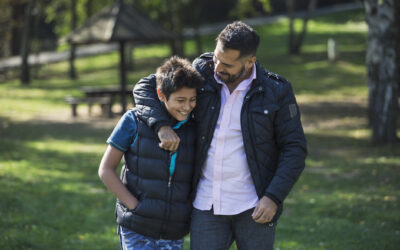I’m no stranger to anxiety. As a seasoned psychotherapist and a parent of two teenagers, anxiety has been a consistent theme in my life. Learning how to navigate my own struggles with anxiety, and the anxiety of my clients has greatly informed my lens towards the anxiety I’ve encountered in parenting.
This dual professional and personal lens has given me a profound appreciation for how anxiety plays a pivotal role in our parenting journey – both for the benefit and for the detriment of all involved. Let’s explore how anxiety manifests in parenting and how we can harness its power to foster growth and resilience in our children and ourself and deepen our connections with our kids.
Understanding Anxiety’s Role in Parenting
Anxiety is a natural response to uncertainty and potential threats – both perceived or imagined and real and actual. Anxiety is a feeling with a force and an energy that can either propel us forward impulsively, immobilize us in a place of inertia or it can inform us to move thoughtfully and with care.
Our children are our hearts and souls embodied; they are everything to us. And yet, they are their own people and our job, while multifaceted as parents, is generally aimed at helping them grow and develop into the best version of themselves. With so much at stake, anxiety is pretty inherent and natural to the path of parenting.
As parents, our anxiety often emerges from a deep-seated concern for our children’s well-being. This worry can be about their safety, their social interactions, their academic success and their future. Anxiety can also stem from both our desire to and the discovery of our inability to control for such events that we think may harm our kids.
Recognizing where, how and when you experience anxiety and naming as specifically as possible the underlying fear or worry is essential to navigating it. If general knowledge is power then self-knowledge is the key to empowerment in charting a new course and learning how to productively utilize the force of anxiety for your parenting.
The Silver Lining of Parental Anxiety
The times I am least proud of my parenting are the times when I have reacted to my children impulsively and out of awareness of the underlying anxiety driving my reactivity. It has been my ongoing practice to recognize the stirrings of anxiety in both myself and in my children and instead of reacting mindlessly, to pause, take a deep breath, ground myself and move more compassionately and sensitively to chart a different path.
- Heightened Awareness and Empathy: Attuning to anxiety about my children’s struggles helps me attune to their emotional states. It prompts me to listen more intently and engage in meaningful conversations. For instance, when one child had a recent drop in grades I could have taken an angry, blaming and punishing route. Instead, I made space to explore together with them what might be underlying issues, such as lack of confidence, overwhelm, learning struggles or other personal stress that could use addressing. We discussed different approaches and ways to garner real support to make a change this year in school. As I said, it has been an ongoing practice at times I nail it and other times I flub up and start over.
- Encouraging Problem-Solving: Parental anxiety can also motivate us to help our children develop problem-solving skills. When faced with a challenge, whether it’s a tough exam or a social dilemma, our anxiety can push us to swoop in and remedy the situation. While this approach may alleviate our anxiety more immediately, it disempowers our kids. Instead, learning how to collaborate with our teens in finding constructive solutions rather than taking over to fix the problem for them can have a longer lasting beneficial impact. Asking other directed questions and doing some digging together can help our children learn how to think constructively about issues and grow in their resilience and independence
- Promoting Open Communication: The stereotype that kids, and teens especially, don’t want to talk to their parents is a pitfall and one we can’t step into. It’s up to us to teach our children how to talk about challenging feelings. Being mindful where, when and with the type of energy we approach our children on tender and vulnerable topics is important.
When anxiety is present, it can be a catalyst for fostering open lines of communication. When we express sensitively and lovingly when we see our kids are struggling or that we ourselves are feeling concerned and wish to try to work together to find a new way through it, we can chart a new path forward. It may take a few attempts, but intermittent and firm gentleness and taking our kids’ expressions to heart can go a long way. This practice of ongoing transparency can strengthen the parent-child relationship and create a supportive environment where both parties feel heard and understood.
Balancing Anxiety and Action
While anxiety can serve as a valuable tool, it’s essential to strike a balance between constructive concern and overbearing control. Here are some strategies to manage anxiety effectively:
- Self-Awareness: Recognize when your anxiety is becoming overwhelming. As a therapist, I often remind myself and my clients that acknowledging the ascending ladder of sensations that our anxiety builds upon is the first step towards managing our reactions. Attuning to the nuanced stirrings and sensations of how anxiety begins to show up for us is not only beneficial for you, but your practice of emotional awareness and regulations provides modeling for your kids to do the same. Regular self-reflection and mindfulness practices can help us understand the nuances of our anxiety and whether it is serving us or hindering our parenting.
- Set Boundaries: It’s important to differentiate between being involved and being intrusive. Allowing your children the space to make their own decisions, even if they lead to mistakes, is crucial for their development. Trusting in their ability to navigate challenges fosters independence and reduces unnecessary stress on both sides.
- Seek Support: Don’t hesitate to seek support from friends, family, or a mental health professional. Sharing your experiences and concerns can provide fresh perspectives and practical solutions. Sometimes, discussing your anxieties with others can also validate your feelings and reduce the emotional burden and tendency to speak in emotionally charged ways to your children.
Conclusion
Anxiety, when managed thoughtfully, can be a powerful ally in parenting. It prompts us to be more vigilant, empathetic, and engaged in our children’s lives. By cultivating awareness of how anxiety shows up for us and our kids, by understanding its role and implementing strategies to balance and channel it effectively, we can transform anxiety from a source of stress into a catalyst for positive parenting and deeper and more fulfilling relationships with our children.
As both a therapist and a parent, my journey with anxiety has taught me how foolish focusing on eliminating anxiety entirely is. The real gift is learning how to create space for and accept the inherent nature of anxiety in parenting and practice attunement to anxiety in ways that enhance our parenting and support our children’s growth. Embrace the role of anxiety, and let it guide you towards becoming a more mindful and compassionate parent.
Struggling with anxiety in your parenting journey? We get it and are here to help. Get started today. https://www.bhavatherapygroup.com/contact-us/
Resources:
Craske, M. G., Rauch, S. L., Ursano, R., Prenoveau, J., Pine, D. S., & Zinbarg, R. E. (2011). What is an anxiety disorder?. Focus, 9(3), 369-388.
Laurin, J. C., Joussemet, M., Tremblay, R. E., & Boivin, M. (2015). Early forms of controlling parenting and the development of childhood anxiety. Journal of Child and Family Studies, 24, 3279-3292.
Pereira, A. I., Barros, L., Mendonça, D., & Muris, P. (2014). The relationships among parental anxiety, parenting, and children’s anxiety: The mediating effects of children’s cognitive vulnerabilities. Journal of Child and Family Studies, 23, 399-409.



